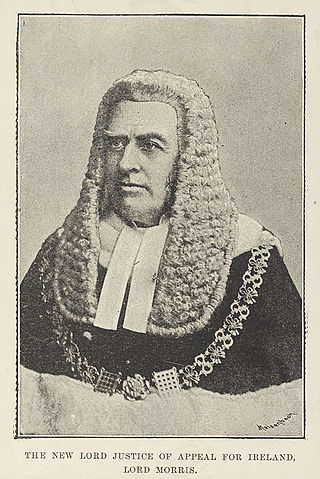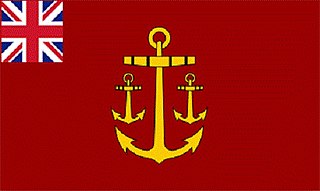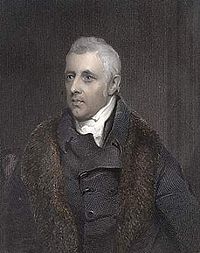
The Chancellor of the Exchequer, often abbreviated to Chancellor, is a senior minister of the Crown within His Majesty's Government, and head of His Majesty's Treasury. As one of the four Great Offices of State, the chancellor is a high-ranking member of the British Cabinet.

The Lord President of the Council is the presiding officer of the Privy Council of the United Kingdom and the fourth of the Great Officers of State, ranking below the Lord High Treasurer but above the Lord Keeper of the Privy Seal. The Lord President usually attends and is responsible for chairing the meetings of the Privy Council, presenting business for the approval of the Sovereign. In the modern era, the incumbent is by convention always a member of one of the houses of Parliament, and the office is normally a Cabinet position.

The Right Honourable is an honorific style traditionally applied to certain persons and collective bodies in the United Kingdom, the former British Empire and the Commonwealth of Nations. The term is predominantly used today as a style associated with the holding of certain senior public offices in the United Kingdom, Canada, New Zealand, and, to a lesser extent, Australia.

The president of the Board of Trade is head of the Board of Trade. A committee of the Privy Council of the United Kingdom, it was first established as a temporary committee of inquiry in the 17th century, that evolved gradually into a government department with a diverse range of functions. The current holder of the post is Kemi Badenoch, who is concurrently the secretary of state for business and trade.
The Treasurer of the Household is a member of the Royal Household of the Sovereign of the United Kingdom. The position is usually held by one of the government deputy Chief Whips in the House of Commons. The current holder of the office is Marcus Jones MP.

The First Sea Lord and Chief of the Naval Staff (1SL/CNS) is a statutory position in the British Armed Forces usually held by a four star admiral. As the highest-ranking officer to serve in the Royal Navy, the chief is the principal military advisor on matters pertaining to the navy and a deputy to the Secretary of State for Defence. In a separate capacity, the CNS is a member of the Chiefs of Staff Committee and, thereby, a military advisor to the National Security Council, the prime minister and the monarch. The First Sea Lord is typically the highest-ranking officer on active duty of the Royal Navy unless the Chief of the Defence Staff is a naval officer. Admiral Ben Key was appointed First Sea Lord in November 2021.

The post of Controller of the Navy was originally created in 1859 when the Surveyor of the Navy's title changed to Controller of the Navy. In 1869 the controller's office was abolished and its duties were assumed by that of the Third Naval Lord whose title then changed to Third Naval Lord and Controller of the Navy. In 1904 the title was changed again to Third Sea Lord and Controller of the Navy. In 1965 the office of the Third Sea Lord was abolished. The post-holder is responsible for procurement and matériel in the British Royal Navy.

The Board of Trade is a British government body concerned with commerce and industry, currently within the Department for Business and Trade. Its full title is The Lords of the Committee of the Privy Council appointed for the consideration of all matters relating to Trade and Foreign Plantations, but is commonly known as the Board of Trade, and formerly known as the Lords of Trade and Plantations or Lords of Trade, and it has been a committee of the Privy Council of the United Kingdom. The board has gone through several evolutions, beginning with extensive involvement in colonial matters in the 17th century, to powerful regulatory functions in the Victorian Era and early 20th century. It was virtually dormant in the last third of the 20th century. In 2017, it was revitalised as an advisory board headed by the International Trade Secretary who has nominally held the title of President of the Board of Trade, and who at present is the only privy counsellor of the board, the other members of the present board filling roles as advisors.
In the United Kingdom there are at least six Lords Commissioners of His Majesty's Treasury, serving as a commission for the ancient office of Treasurer of the Exchequer. The board consists of the First Lord of the Treasury, the Second Lord of the Treasury, and four or more junior lords acting as whips in the House of Commons to whom this title is usually applied.

Graham Charles Stuart is a British politician. A member of the Conservative Party, he has been the Member of Parliament for Beverley and Holderness since 2005, and recently served as the Minister of State for Energy Security and Net Zero. He served as Parliamentary Under-Secretary of State for Exports from 2018 to 2021, and Minister of State for Europe from July to September 2022.

The Attorney-General for Ireland was an Irish and then United Kingdom government office-holder. He was senior in rank to the Solicitor-General for Ireland: both advised the Crown on Irish legal matters. With the establishment of the Irish Free State in 1922, the duties of the Attorney-General and Solicitor-General for Ireland were taken over by the Attorney General of Ireland. The office of Solicitor-General for Ireland was abolished at the same time for reasons of economy. This led to repeated complaints from the first Attorney General of Ireland, Hugh Kennedy, about the "immense volume of work" which he was now forced to deal with single-handedly.

The Vice-Chamberlain of the Household is a member of the Royal Household of the Sovereign of the United Kingdom. The officeholder is usually a senior government whip in the British House of Commons ranking third or fourth after the Chief Whip and the Deputy Chief Whip. The Vice-Chamberlain is the Deputy to the Lord Chamberlain of the Household and, like the Lord Chamberlain, carries a white staff of office when on duty on state occasions.

The Fifth Sea Lord was formerly one of the Naval Lords and members of the Board of Admiralty that controlled the Royal Navy. The post's incumbent had responsibility for naval aviation.
Harry Powlett, 4th Duke of Bolton PC, known until 1754 as Lord Harry Powlett, was a British nobleman and Whig politician. He sat in the House of Commons from 1715 to 1754, when he took his seat in the House of Lords.

Admiral Maurice Frederick FitzHardinge Berkeley, 1st Baron FitzHardinge, was a Royal Navy officer. As a junior officer he commanded gunboats on the Tagus, reinforcing the Lines of Torres Vedras, in Autumn 1810 during the Peninsular War and, as a captain, he served on the coast of Syria taking part in the capture of Acre in November 1840 during the Oriental Crisis. He also served as Whig Member of Parliament for Gloucester and became First Naval Lord in the Aberdeen ministry in June 1854 and in that role focussed on manning the fleet and in carrying out reforms and improvements in the food, clothing, and pay of seamen.

The First Lord of the Admiralty, or formally the Office of the First Lord of the Admiralty, was the political head of the English and later British Royal Navy. He was the government's senior adviser on all naval affairs, responsible for the direction and control of the Admiralty, and also of general administration of the Naval Service of the Kingdom of England, Great Britain in the 18th century, and then the United Kingdom, including the Royal Navy, the Royal Marines, and other services. It was one of the earliest known permanent government posts. Apart from being the political head of the Naval Service the post holder was simultaneously the pre-eminent member of the Board of Admiralty. The office of First Lord of the Admiralty existed from 1628 until it was abolished when the Admiralty, Air Ministry, Ministry of Defence and War Office were all merged to form the new Ministry of Defence in 1964. Its modern-day equivalent is the Secretary of State for Defence.

During the early 17th century, England's relative naval power deteriorated; in the course of the rest of the 17th century, the office of the Admiralty and Marine Affairs steered the Navy's transition from a semi-amateur Navy Royal fighting in conjunction with private vessels into a fully professional institution, a Royal Navy. Its financial provisions were gradually regularised, it came to rely on dedicated warships only, and it developed a professional officer corps with a defined career structure, superseding an earlier mix of sailors and socially prominent former soldiers.

The Comptroller of the Navy originally called the Clerk Comptroller of the Navy was originally a principal member of the English Navy Royal, and later the British Royal Navy, Navy Board. From 1512 until 1832, the Comptroller was mainly responsible for all British naval spending and directing the business of the Navy Board from 1660 as its chairman. The position was abolished in 1832 when the Navy Board was merged into the Board of Admiralty. The comptroller was based at the Navy Office.

The Judge of the High Court of Admiralty was established in 1483 he was the chief law officer of the High Court of Admiralty. The office holder was supported by various officials and existed until 1875.
As part of the British honours system, Special Honours are issued at the Monarch's pleasure at any given time. The Special Honours refer to the awards made within royal prerogative, operational honours, political honours and other honours awarded outside the New Years Honours and Birthday Honours.














